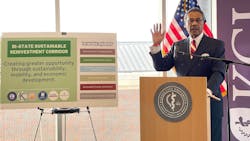Kansas-Missouri Bi-State Sustainable Reinvestment Corridor project proposed
A proposed 24-mile regional rapid transit corridor has been proposed by a group of elected leaders in Kansas and Missouri that they say will “maximize federal funding” from the Bipartisan Infrastructure Law and create opportunity with investments in sustainability, mobility and economic development.
U.S. Reps. Emanuel Cleaver, II (D-MO-5) and Sharice Davids (D-KS-3), along with Mayors Eileen Weir (Independence, Mo.) and Tyrone Garner (Kansas City, Kan.), as well as Jackson County Executive Frank White introduced the plan that has also been endorsed by the Mid-America Regional Council (MARC), the Kansas City Area Transportation Authority (KCATA) and RideKC.
The partners describe the Bi-State Reinvestment Corridor as a “cooperative effort to create and implement a transformational strategy to enhance mobility, transform communities and reduce carbon emissions.”
Not only is the proposed transit project a cooperative effort among stakeholders, but one of its goals is to demonstrate the potential of integrated investments to enhance neighborhood vibrancy, affordability, equity and connectivity as a model for other corridor-based programs.
“By coming together and uniting behind a comprehensive plan to expand the region’s zero-emission transportation, build out our green infrastructure, connect communities in a sustainable way and facilitate economic development through clean energy, we believe this corridor can attract key federal investments that will be a catalyst for greater economic growth while cutting down on emissions and harmful pollution. As we continue to reach out to local stakeholders and neighborhood leaders to see how local projects can fit into this framework, I want to thank Rep. Davids, Mayors Weir, Garner and Lucas and County Executive White for their partnership in this exciting effort,” said Rep. Cleaver.
The Bi-State Sustainable Reinvestment Corridor will target federal grant funding from the Bipartisan Infrastructure Law that would support:
- Zero-emission transportation options: Electric buses; new and upgraded mobility hubs; expanded KC Streetcar and MAX services; and pedestrian and bicycle infrastructure.
- Affordable housing: Energy-efficient retrofits; new units and construction; and transit-oriented/connected development.
- Green infrastructure: Enhanced tree canopy coverage; upgraded stormwater systems; electric vehicle charging stations; and residential solar panels.
- Broadband Access: Implementation of wired and wireless service; increased capacity; and updated equipment.
- Safety and security enhancement: Shot spotter; license plate readers; Community Improvement Districts; and other public safety technologies.
- Economic development: Workforce training; access to child care; and private investment along the corridor.
- Public schools and libraries: Renewable energy and energy efficiency projects to reduce utility costs.
“The Bi-state Reinvestment Corridor is directly aligned with KCATA’s mission to provide equitable access to jobs, medical care, affordable housing and education,” said Robbie Makinen, KCATA president and CEO. “We look forward to working with Rep. Cleaver, other congressional delegates and the community to build this reinvestment corridor that includes workforce development, green infrastructure and valuable transit improvements.”
The proposed rapid transit corridor would serve between 85,000 and 90,800 who live within a half-mile of the proposed corridor and provide connections to existing KC Streetcar and MAX bus services.
About the Author

Mischa Wanek-Libman
Group Editorial Director
Mischa Wanek-Libman is director of communications with Transdev North America. She has more than 20 years of experience working in the transportation industry covering construction projects, engineering challenges, transit and rail operations and best practices.
Wanek-Libman has held top editorial positions at freight rail and public transportation business-to-business publications including as editor-in-chief and editorial director of Mass Transit from 2018-2024. She has been recognized for editorial excellence through her individual work, as well as for collaborative content.
She is an active member of the American Public Transportation Association's Marketing and Communications Committee and served 14 years as a Board Observer on the National Railroad Construction and Maintenance Association (NRC) Board of Directors.
She is a graduate of Drake University in Des Moines, Iowa, where she earned a Bachelor of Arts degree in Journalism and Mass Communication.
